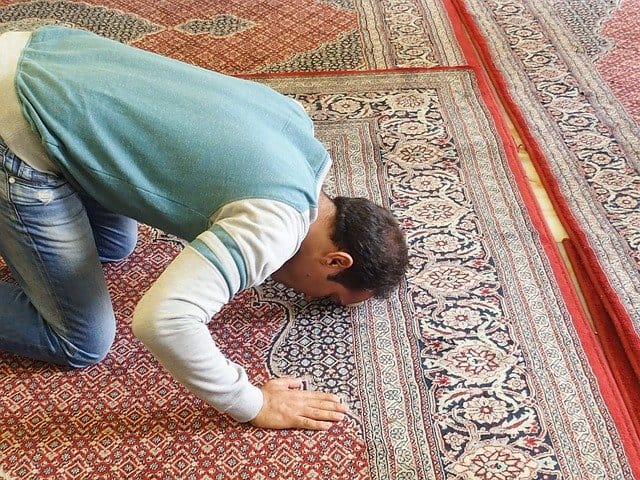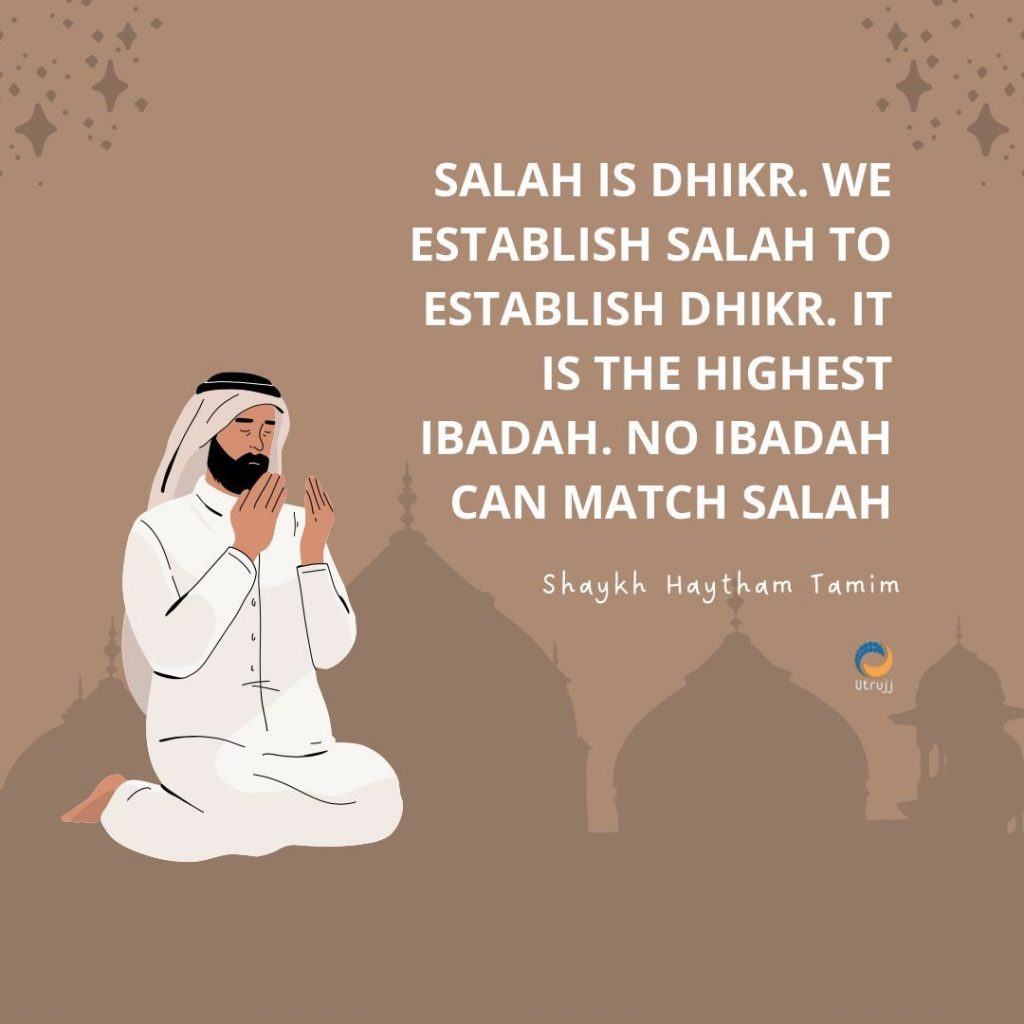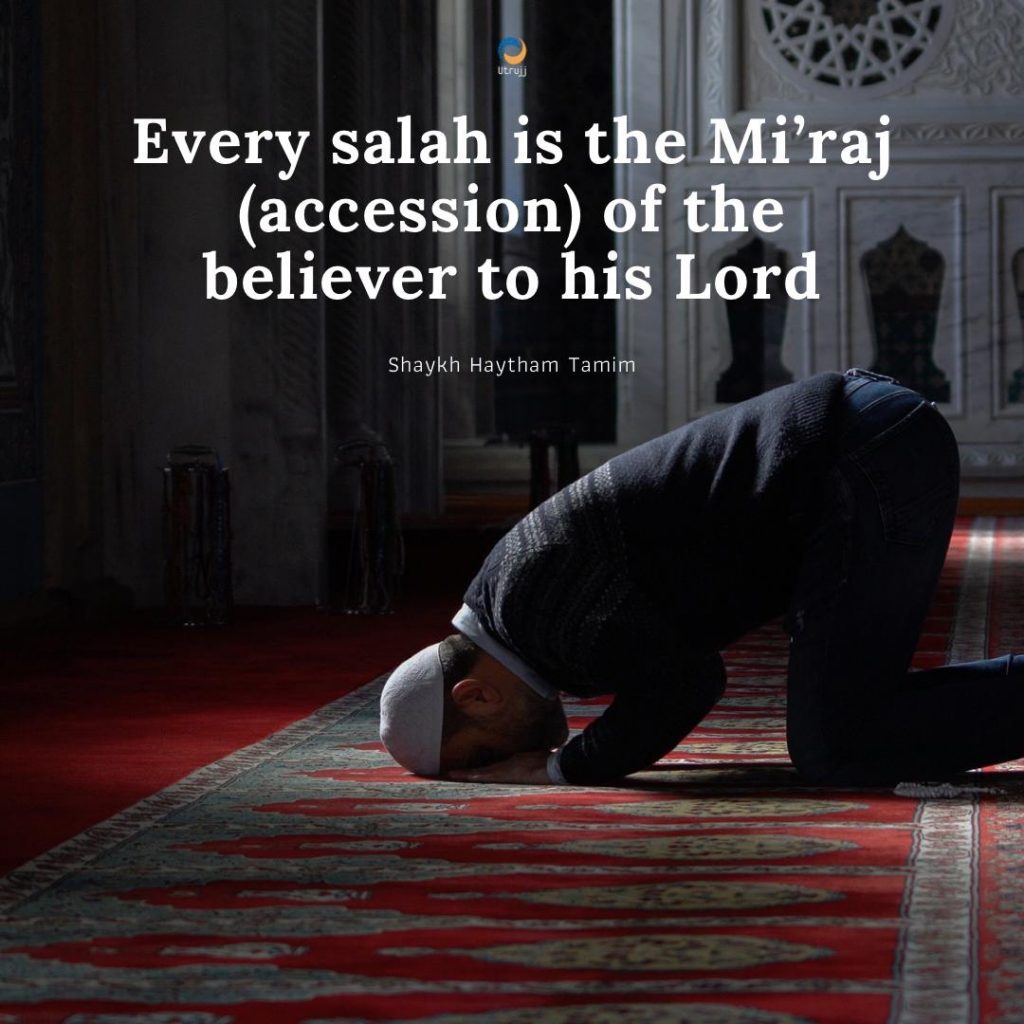The first thing you will be asked about is your Salah

We are living in uncertain times. We have witnessed huge losses of life worldwide, through the pandemic and world disasters, and personally we have all experienced the death of close family and friends. None of us knows how long we have therefore we need to be prepared for the eventuality we will all inevitably face – death.
Once we die, we will be heading for the most serious audit of our lives. In this life, we prepare our annual tax returns, after death we will have to submit a return for our whole life. Every singe one of us will have to submit our Books for inspection, and so it goes against reason not to get our Books in order before this reality hits us. A reality which no one can escape.
How can we be ready to meet Allah Almighty? Instead of focusing on something over which we have no control (the time of our death), we can focus on something that we have control over (our actions).
Imagine if death was coming in an hour, what would be on the list of our priorities? What if we only had a week? Or a month?
Prepare for tomorrow – the first question you will be asked
Allah Almighty reminds us in the Quran to prepare ourselves for the ‘morrow’. He said:
يَا أَيُّهَا الَّذِينَ آمَنُوا اتَّقُوا اللَّهَ وَلْتَنظُرْ نَفْسٌ مَّا قَدَّمَتْ لِغَدٍ ۖ وَاتَّقُوا اللَّهَ ۚ إِنَّ اللَّهَ خَبِيرٌ بِمَا تَعْمَلُونَ
O you who believe! Fear God, and let every soul consider what it has forwarded for the morrow, and fear God. God is Aware of what you do. (59:18)
The meaning of tomorrow
Tomorrow is the Qur’anic term for the hereafter. In Surat al Hashr above, when Allah Almighty talks about tomorrow, He is referring to the Hereafter. Our tomorrow might be today.
In the same ayah, Allah Almighty says itaqullah, often translated as ‘Fear Allah’, though this is not the best translation. The quick, comprehensive definition of taqwa is fulfilling obligations and refraining from the prohibitions.
Another definition of this ayah is to ‘fear the Almighty, and act upon the revelation. And prepare for the day of your departure, and be content with what you have been given.’
Thus when Allah Almighty says itaqullah, he means prepare for that day.
Tomorrow we will all be asked how we fared in the main task we were obligated to perform as Muslims. As per the hadith, the very first question we will be asked is whether we fulfilled our covenant with Allah to pray 5 times a day.
وعن أبي هريرة رضي الله عنه قال: قال رسول الله صلى الله عليه وسلم: “إن أول ما يحاسب به العبد يوم القيامة من عمله صلاته، فإن صلحت، فقد أفلح وأنجح، وإن فسدت، فقد خاب وخسر، فإن انتقص من فريضته شيئًا، قال الرب، عز وجل: انظروا هل لعبدي من تطوع، فيُكمل منها ما انتقص من الفريضة؟ ثم يكون سائر أعماله على هذا”. ((رواه الترمذي وقال حديث حسن)).
Abu Hurayrah (may Allah be pleased with him) reported that the Messenger of Allah (peace be on him) said:
“The first of man’s deeds for which he will be called to account on the Day of Resurrection will be Salat.
If it is found to be perfect, he will be safe and successful; but if it is incomplete, he will be unfortunate and a loser.
If any shortcoming is found in the obligatory Salat, the Glorious and Exalted Rabb will command to see whether His slave has offered any voluntary Salat so that the obligatory Salat may be made up by it. Then the rest of his actions will be treated in the same manner.” [Tirmidhi]
Don’t be complacent
So much significance is placed on the salah, that Jabir Ibn Abdullah (may Allah be pleased with him) narrated that the Prophet (peace be on him) said:
“Between faith and unbelief is abandoning the prayer.” (Muslim, Abu Dawud, Tirmidhi, Ibn Majah, Musnad)
Everyone knows that salah is one of the pillars of Islam. Yet not all Muslims pray nor give Allah His due by presenting themselves before Him in salah. Whether one hears the adhan or not, once the time for prayer arrives, one is expected to turn up as one would to any other meeting or appointment scheduled for that day. However, some postpone their salah, while others do not even give it a thought, vaguely hoping perhaps that somehow it will be overlooked that they did not show up and perform it.
In people’s minds, the pressing urgencies of day-to-day life obscure the greater urgency of the single most important pillar of Islam.

Salah is our shield from hell-fire
Prayer is our appointed time to remember and connect with Allah, and it is this connection with Him and our remembrance of Him which becomes our protection. Abu Hurayrah reported that the Messenger of Allah (peace be upon him) said:
“Take up your shields.” They said, “O Messenger of Allah, is the enemy present?” The Prophet said, “No, rather your shields from the hellfire are to declare the glory of Allah, the praise of Allah, there is no God but Allah, and Allah is the greatest. Verily, they will come on the Day of Resurrection as saviours and guardian angels, and they are ‘righteous deeds everlasting.’” (18:46)
What is taqwa
The core of being Muslim is having taqwa, which means fulfilling our obligations and refraining from the prohibitions.
The opposite of taqwa is doing what is prohibited (this is mahaarim) and not doing what you have been commanded to do.
If one thinks they are doing enough by not doing anything haram, such as drinking, that is not enough, unless you are also doing what you have to do. If you are not doing what you have been commanded to do, that is also haram. Not praying is a sin, just as consuming riba (interest) is a sin, or not going for hajj or not paying zakat and not being kind to your parents. We need to understand that refraining from prohibitions is only half the story, doing the obligations completes taqwa.
We have been told that those who will be successful (al muflihoon) on the Day of Judgement are those who are amongst al muttaqeen, those who have taqwa of Allah Almighty.
The Prophet (peace be on him) said:
Avoid prohibitions (mahaarim) you will be the most worshipping of people. (Timidhi)
If we want a shortcut to the top level of worship, we have to do the obligations as well as refrain from the prohibitions. Then we will excel.
Conditions of fulfilling your obligations
Allah Almighty does not accept all deeds. Some are rejected because they were not performed for the right reasons, the right intention was lacking. Some are rejected because they are not performed in accordance with the guidelines which were laid out in the Sunnah. For instance if you pray because you are trying to impress others, it will not be accepted by Allah. Or if you pray without wudu, which is condition of salah, it will not be accepted.
Allah Almighty only accepts the actions which have been performed out of sincerity (ikhlas) and in line with prophetic guidance.
In Surat al Furqan, we see the terrifying and striking image of piles of a deeds accumulated over a lifetime, amounting to nothing, being utterly worthless, like dust that blows away in the wind.
﴿٢٣﴾ وَقَدِمْنَا إِلَىٰ مَا عَمِلُوا مِنْ عَمَلٍ فَجَعَلْنَاهُ هَبَاءً مَنْثُورًا
And We will proceed to their deeds, and We will reduce them to scattered dust. [25:23]
This means that we have to be careful. The Prophet (peace be on him) was sent to clarify the way to Allah, what they should do and the conditions for the acceptance of their deeds. There are two things which qualify a deed for acceptance:
There are two things which qualify a deed for acceptance:
1. The intention is crucial.
2. The action has to be in accordance in the guidance of the Prophet (peace be on him)
Will your deeds be accepted?
In Surat al Kahf, Allah Almighty draws our attention to those who assume they are pious and doing the right things, but their deeds are not acceptable to Allah. Again, this is scary.
We cannot take for granted that our deeds are worthy of acceptance.
Actions are presented to Allah every week
We have to remember that our deeds are presented to Allah. Abu Hurayrah (may Allah be pleased with him) narrated that the Messenger of Allah (peace be on him) said:
وعن أبي هريرة رضي الله عنه قال: قال رسول الله صلى الله عليه وسلم : “تعرض الأعمال في كل اثنين وخميس، فيغفر الله لكل امرئ لا يشرك بالله شيئا، إلا امرءا كانت بينه وبين أخيه شحناء، فيقول: اتركوا هذين حتى يصطلحا” ((رواه مسلم)).
“People’s deeds are presented before Allah on Mondays and Thursdays, and then every slave (of Allah) is granted forgiveness (of minor sins) if he does not associate anything with Allah in worship.” [Muslim]
Are your actions worthy of being presented?
Priorities
The clear indication that salah has to be our priority in life is that Allah will ask about it first. In addition the command to pray appears throughout the Quran, as well as with the emphasis we ensure it is performed regularly at its appointed time.
Surely the Salah at fixed hours (of the day and night) has been enjoined upon the believers.” (4:103)
This is because salah creates a god- centred focus on the life of a believe and a rhythm in their day. It is an enforced time-out from this life, to recalibrate oneself and being the (otherwise seemingly distant) akhirah back into view so that it becomes a guiding mechanism in our choices and actions.
“Verily, Salah restrains (oneself) from shameful and unjust deeds…” (29:45)
Salah is not a chore, it is the gateway to goodness
To those see salah as a chore, it would help them if they realised the benefits they would feel in their life when they perform their salah. When you are obedient to Allah, and fulfil your side of the bargain, many aspects of your life will fall into place and doors to goodness will open for you.
The Messenger of Allah (peace be on him) said:
“On the Day of Judgment, a slave will be questioned about his prayers first. If his prayers are good, his other deeds will be good, too. If his prayers are bad, his other deeds will be bad, too.” (Tabarani, Targhib)
Those who are pre-occupied and too consumed by the pleasures or the pressures of life to find the time or make the effort to pray, should know that Allah is All Aware and that the angels are making meticulous notes about what we do, good and bad, and we what we neglected to do, which was expected of us.
Salah is your lifeline
What is more important than Allah in our life? When we are connected to Allah Almighty and then He eases our way. If you are with Allah, Allah is with you. Nothing makes us closer to Allah than the salah. So we need to perfect our salah. When we feel that we need to communicate with Allah more than we need oxygen, then we are on the straight path. If we do not have enough oxygen, we faint.
If you want your day to be better, fix your salah. Your relationship with Allah your relationship with people, fix your salah.
Praying on time is the best deed
Abdullah bin Mas’ud asked the Prophet (peace be upon him) about the best deeds. The Prophet (peace be upon him) replied:
‘The prayer on time’ [Abu Dawood]

It is Allah’s right to be worshipped and the servant’s right to call upon Him
Ibn Rajab an Hanbali said:
Allah’s right is to be worshipped and the servant’s right is to ask.
This is very deep. In many verses of the Quran, Allah Almighty says that He will respond to us if we call Him. For instance:
Call upon Me I will respond (40:60)
When My servants ask you about Me, tell them I am near; answering the prayer of the suppliant when he prays to Me. (2:186)
That is why Allah talks refers to al musaloon those who keep their prayers, because they are first in line. We also note from the sequence of these verse, that we have to remember Allah first, then He responds to us.
Remember Me and I will remember you. (2:152)
Straighten your salah and it will straighten you
The Prophet (peace be on him) told us an-tuqeem as-salah. The Quran does not say ‘pray’ (yusaloontusalli) it says establish prayer tuqamatis salah. This is a significant point.
The word yuqeemu and iqama derives from three letters qa wa ma. When you open the dictionary, you look under qa wa ma, from that word it means to make something straight. Just as the orthodontist is the one who straightens teeth taqween al isnan, or the carpenter does taqweem to wood i.e. makes it straight.
Therefore the salah should make us straight. This is the prophetic salah and this is why the Prophet (peace be on him) said,
‘Pray the way you have seen me praying.’ (Bukhari)
Salah is very prescriptive and this is what puts you on the straight path and why Allah keeps repeating straighten your salah.
When you pray this salah it makes you a different person. You become a person of Allah.
Salah is the core of the deen
The Prophet (peace be on him) says:
Salah is the pillar of Islam and whosoever abandons it, demolishes the very pillar of religion. (Bayhaqi)
It is the main pillar of the Islam. It is the core of the deen. Accordingly, whoever establishes it establishes the deen. Whoever leaves salah, it is as if they have abolished the deen. In Surah Muminoon, Allah Almighty praises those who maintain their prayers.
وَالَّذينَ هُم عَلىٰ صَلَوٰتِهِم يُحافِظونَ
Those who safeguard their prayers. (23:9)
إِلَّا المُصَلّينَ
In Surah Maarij, Allah Almighty says those who are constantly praying on time (daimoon) and observant of their prayers (yuhafiduun). Allah is emphasising this in different verses.
Except the prayerful. (70:22)
الَّذينَ هُم عَلىٰ صَلاتِهِم دائِمونَ
Those who are constant at their prayers. (70:23)
وَالَّذينَ هُم عَلىٰ صَلاتِهِم يُحافِظونَ
And those who are dedicated to their prayers. (70:34)
Therefore we cannot take salah lightly, or be dismissive of the fact if we miss our salah. It is a big deal.
When you pray reflects your connection with Allah
While the Prophet (peace be on him) longed for the adhan and to pray, look at our state. Today we try and escape salah or ignore it. We hear the notification from our app, but we try and finish what we are doing first.
We often get absorbed in what we are doing, and postpone our salah, then end up forgetting to pray it. This delay is reflection of or internal status and means we have issues we need to resolve in order to improve our connection with Allah Almighty. We need to get to the bottom of them.
Praying on time reflects your priorities
Why does it matter if you pray on time? You might say it does not matter when you pray, as long as you do not miss the salah. However the speed with which you drop what you are doing and go to pray is a reflection of your priorities. It is a reflection of whether Allah Almighty is your main concern or the dunya. I tell my friends and my students and myself, make your salah the core of your day. Your day should revolve around your salah. Only when you day revolves around our salah and you plan your day, your commitments and meetings around the salah, will you feel the difference and achieve that connectivity. If you achieve one thing at the end of this course, and it is this, you will achieve a lot.
Make the salah the core of your day. Do not fit your salah around your day. Your day should rotate around your salah.
When you make Allah number one in your life, He will make you number one. When you honour the salah, Allah honours you.
Being Allah’s servant is an honour and a responsibility
It is an honour that He invited us to this meeting at all. If we had a meeting with the Queen, we might stand before the mirror and practice what we will say beforehand. This is why we do our preparation before hand, – brushing teething, washing and dressing in clean clothes, because we are talking to Allah Almighty.
Salah is a conversation with Allah Almighty

The Prophet (peace be on him) said during salah we are conversing (yunaji) with Allah Almighty.
عن أَنَس بْن مَالِكٍ قَالَ قَالَ النَّبِيُّ – صلى الله عليه وسلم – « إِنَّ الْمُؤْمِنَ إِذَا كَانَ فِي الصَّلاَةِ فَإِنَّمَا يُنَاجِي رَبَّهُ» صحيح البخاري ومسلم.
‘The believer when he is in his prayer indeed he is conversing with His Lord.’ [Bukhari and Muslim]
Salah is therefore a dialogue (munajat) between us and Allah Almighty. The Prophet (peace be on him) is giving us a glimpse of the unseen by telling us what is going on during our salah behind the curtains. We need to take advantage of this. This is very special, it is not imaginary, it is reality that in salah we are talking to Allah Almighty. When we realise that salah is our intimate discourse with Allah Almighty, and we pray conscious of this fact, we would not dismiss it and say to someone, ‘I will be with you in two minutes. I just have to pray.’
Abu Hanifa, apart from being a scholar, was a businessman who used to trade in textiles and even had special clothes tailor-made for his night prayer- for his meeting with Allah.
When we recite do we hear Allah’s reply? We need to clear our eyes and polish our heart. Some people can. It needs a lot of work. Make dua and ask Allah to enable you to perfect salah.
Allah’s reply to His servant
عَنْ أَبِي هُرَيْرَةَ رضي الله تعالى عنه،قال :إِنِّي سَمِعْتُ رَسُولَ اللَّهِ صلى الله عليه وسلم يَقُولُ :’ قَالَ اللَّهُ تَعَالَى: قَسَمْتُ الصَّلاَةَ بَيْنِي وَبَيْنَ عَبْدِي نِصْفَيْن، وَلِعَبْدِي مَا سَأَلَ . فَإِذَا قَالَ الْعَبْدُ: { الْحَمْدُ لِلَّهِ رَبِّ الْعَالَمِينَ} . قَالَ اللَّهُ تَعَالَى :حَمِدَنِي عَبْدِي ، وَإِذَا قَالَ: { الرَّحْمَنِ الرَّحِيمِ} . قَالَ اللَّهُ تَعَالَى :أَثْنَى عَليَّ عَبْدِي . وَإِذَا قَالَ: { مَالِكِ يَوْمِ الدِّينِ} . قَالَ : مَجَّدَنِي عَبْدِي – وَقَالَ مَرَّةً: فَوَّضَ إِلَيَّ عَبْدِي – فَإِذَا قَالَ :{ إِيَّاكَ نَعْبُدُ وَإِيَّاكَ نَسْتَعِينُ} . قَالَ: هَذَا بَيْنِي وَبَيْنَ عَبْدِي ، وَلِعَبْدِي مَا سَأَلَ . فَإِذَا قَالَ: { اهْدِنَا الصِّرَاطَ الْمُسْتَقِيمَ * صِرَاطَ الَّذِينَ أَنْعَمْتَ عَلَيْهِمْ غَيْرِ الْمَغْضُوبِ عَلَيْهِمْ وَلاَ الضَّالِّينَ} . قَالَ: هَذَا لِعَبْدِي وَلِعَبْدِي مَا سَأَلَ ’ . رواه مسلم.
Abu Hurayrah (may Allah be pleased with him) narrated that he had heard the Messenger of Allah (peace be on him) say:
‘ Allah the Most High said: I have divided the prayer into two halves between Me and My servant. Half of it is for Me and half of it is for My servant.’ (Muslim).
The Prophet (peace be on him) is opening a window to the Unseen when He reveals Allah’s side of the conversation during our salah, which we do not hear. The salah is a two-way street between us and Allah Almighty, in which Allah Almighty does listen to and reply to our supplications. It is us who are inattentive in our salah, and unaware of His reply. We can reflect.
Abu Hurayrah explained the division of the conversation between us and Allah, as the Prophet (peace be on him) said:
Allah Almighty said: I have divided prayer between myself and my servant into two halves, and My servant shall have what he has asked for.
When the servant says, ‘All praise is due to Allah the Lord of the worlds,’ Allah says: My servant has praised me.
When he says ‘the Gracious, the Merciful,’ Allah says: My servant has exalted me.
When he says, ‘The Master of the Day of Judgment,’ Allah says: My servant has glorified me and my servant has submitted to me.
When he says, ‘You alone we worship, you alone we ask for help,’ Allah says: This is between me and my servant, and My servant will have what he has asked for.
When he says, ‘Guide us to the straight path, the path of those whom you have favoured, not those who went astray,’ Allah says: This is for my servant, and my servant will have what he has asked for. (Muslim)
It is beautiful that Allah calls us ‘MY servant’. We belong to Him. If we were to carry a badge that we belong to a special team or ministry or force, then we would have to follow their code of conduct to be the representative of that body. Allah has given us the special badge, of His servant, so we need to think about this:
When your son does something good, you want to tell the whole world he is your son and you feel so proud. When he does something bad, you hide your face and don’t want to tell anyone. Of course, you don’t want to disown him, but you feel ashamed. When we are Allah’s servant, we have a responsibility how we carry ourselves. So let’s do good. We have to be worthy of being in that position of servitude.
The salah is purification
Jabir ibn Abdullah reported that the Messenger of Allah (peace be upon him) said:
عَنْ جَابِرٍ قَالَ قَالَ رَسُولُ اللَّهِ صَلَّى اللَّهُ عَلَيْهِ وَسَلَّمَ مَثَلُ الصَّلَوَاتِ الْخَمْسِ كَمَثَلِ نَهْرٍ جَارٍ غَمْرٍ عَلَى بَابِ أَحَدِكُمْ يَغْتَسِلُ مِنْهُ كُلَّ يَوْمٍ خَمْسَ مَرَّاتٍ
“The parable of the five prayers is that of a river running at your door in which one cleanses himself five times a day.” [Muslim]
Salah is what distinguishes believers from non-believers. It cleanses us of our sins, bringing forgiveness from one salah to the next. Therefore we should do our best to preserve it and protect it and perform it in accordance with the way we were taught it. It brings discipline to our lives and enables our soul to ascend to heaven, bringing relief and comfort.
Shaykh Haytham Tamim 19th August 2022
Related posts
How to Fix Your Salah – the benefits of salah
Settle your account before it is too late
When can I shorten and combine salah while travelling?
Do you have to make up missed salah?
- Why should you follow up one good action with another one?
- Don’t be a Ramadani person – Be a Rabbani person.
- How do you pray Salat al-Kusuf – the prayer during a solar eclipse
- The test of will – Tarawih Reflections 30
- Why humans can’t be gods – Tarawih reflections 29
Recommended Posts

Don’t be a Ramadani person – Be a Rabbani person.
April 10, 2024

The test of will – Tarawih Reflections 30
April 09, 2024

